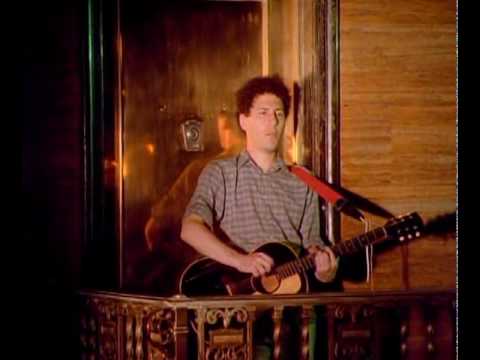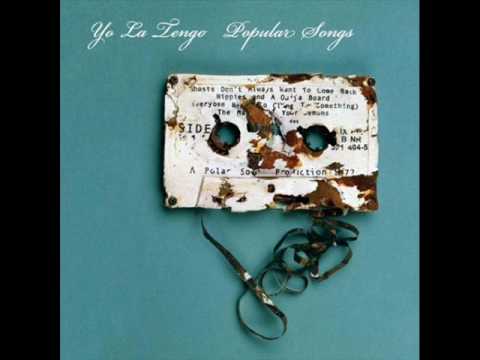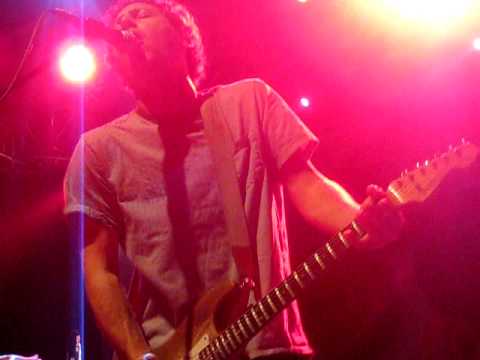Yo La Tengo make videos, explaining things like how they got their name. They collect, on their blog, photographic proof of random findings of their name – and any variant misspellings – seen out there in the world. They watch baseball. They eat hot dogs. And then there’s the music. They make songs, of all shapes and sizes, with 12 studio albums and 14 singles released to date.
Since the early 00s, they’ve played a series of Hannukah sessions at a small space called Maxwell’s in Hoboken, New Jersey, with special guests ranging from David Byrne and Ray Davies to Alex Chilton. They do an annual murdering-the-classics pledges-for-requests fundraiser for WFMU radio. They have solo projects (James’s Dump) and aliases (YLT as the Condo Fucks), they score films (Adventureland), they tweet (Georgia’s Petite Tweets and James’s more frequent, funny ones), and this, with steady organ, two-part vocals, sometimes three, guitars both blisteringly loud and as gently capacious as nightfall over a deep and sweeping vista, and Georgia’s drumming, tight, tight and ever right. Now, they’ve just finished a short UK leg of their new Spin the Wheel tour, a format devised to keep themselves and the audience guessing.
The night is divided into two parts, and the setlist for each is determined by the spinning of a big wheel of fortune. Old-school circus-style letters on the blue, red and yellow slots of this carousel spell out the nine possibilities for the first set: Condo Fucks, Dump, the Freewheeling Yo La Tengo, Songs Starting with S, The Name Game, The Sounds of Science parts 1 and 2, Sitcom Theatre, I’d Like to Buy a Vowel and Spinner’s Choice. Ahead of their turn at Ray Davies’s Meltdown in London, this weekend, The Quietus caught up with lead-singer and guitarist Ira Kaplan to talk about spinning, Seinfeld and Yo La Tengo’s love of songs.
You’ve been doing the Spin the Wheel tour while in England. How did the idea come about?
Ira Kaplan: Well it goes back to a record we made a couple of years ago under the name the Condo Fucks, which was a bunch of cover songs with gnarly fuzzboxes. We enjoyed playing that way, and we wanted to do Condo Fuck shows, but we didn’t want to tour as CF. We don’t like announcing ahead of time what we’re going to do, and it felt against our grain to say ‘Tonight we’re going to be the Condo Fucks.’ We wanted to just show up and do that sometimes. But we try to strike a balance between doing what we want to do, and being sensitive to what an audience wants. So we came up with the idea of not knowing ourselves what we were going to do. These shows are divided into two parts. For the first one, we spin the Wheel, just the once, and the Wheel tells us what to do for those first 40 minutes. It might be a CF set, or a Freewheeling set… and then we’ll do the second set, which completes the picture. So if the Spin the Wheel set was the CF, we’ll play a quieter second set. If it’s the Freewheeling, we’ll play a little louder.
Does that element of surprise push you into new territory when it comes to performing?
IK: Yes, in a couple of ways. We decided to take the Wheel as a cue to learn certain songs that had never been part of our repertoire, or relearn old songs that fit into certain categories like I’d Like to Buy a Vowel – hammering home the Wheel of Fortune aspect of this thing – where songs start with a vowel. But the other thing we discovered is that not knowing what we were going to play when we got on stage, rather than having a set-list, has felt very different. And if you feel different, you play differently. When we did the Spin the Wheel tour in the US, we thought it was something to try and if it didn’t work, we’d just stop. The fact that we’ve now done it in the UK indicates how much we’ve enjoyed it.
How did the Sitcom Theatre option go?
IK: Well it depends on who you ask. We would tell you it went great, but James, who’s the Twitter department, gets more pleasure out of retweeting negative tweets than positive ones, so the retweeting may have given an inaccurately negative overview. In Chicago we did a Seinfeld episode, and then in LA, because of how much tweeting and blogging there was about it, we wanted to keep people on their toes. So once everyone thought we were doing Seinfeld, we decided to do Spongebob Squarepants. James did a classic Spongebob.
Can you describe how it works?
IK: Our staging is pretty rudimentary. It’s basically a table-read – Georgia has proposed renaming it Andy Warhol’s Sitcom Theatre. When we did it in Chicago it was Spinner’s Choice, so an audience member asked for the sitcom option. But there was a woman up front who was saying: "This is my worst fucking nightmare." And so her worst nightmare was what this other guy chose.
I’ve been trying to imagine what the sitcom would be. I didn’t realise you’d be enacting existing ones – I thought perhaps you’d written your own. And all I could think of was the Seinfeld episode where Kramer finds the Merv Griffin set in a dumpster and moves it into his apartment. Setting up a similarly weird and awkward situation seemed so utterly perfect for Yo La Tengo.
IK: Yeah! Well, it seemed a pretty natural progression of things we already do. We have friends in the comedy world and have participated in lots of different shows, like Delocated on the Cartoon Network. It’s a fake reality TV show about someone in the witness relocation programme. He walks around in a ski mask with a voice modulator embedded in his throat so that the Russian mob cannot find him. It’s completely ridiculous. We did a show where we backed him, wearing ski masks and singing with him through harmonisers. For us, Sitcom Theatre seemed like another way to bring that side of our band on to the stage…
Over the years, you’ve developed what almost feel like traditions – the Hannukah sessions, the WFMU fundraisers, the Freewheeling shows. When you first started out, did you imagine yourselves doing this?
IK: Well, no. One necessary ingredient of a tradition is that somebody else cares about it, and I don’t think we anticipated that anybody would. We were just playing for ourselves and it was a pleasant surprise that other people were interested. One thing that has kept us going for so long is trying to appreciate what’s happening at the moment, and spending as little time as possible wishing for something else. A lot of what goes wrong with other bands is say you wish for fame and success and then you get it and you find out it wasn’t what you thought it was going to be. If Peter Cooke and Dudley Moore taught us anything, it’s that getting your wishes isn’t always what you expect. So we’ve just tried to take what’s there and somehow, doing things that way has nevertheless put in front of us the opportunity to play with Ray Davies and Yoko Ono and the Sun Ra Arkestra. It seems to be working out OK.
You’re playing in Ray Davies’s Meltdown this year. How did you meet?
IK: I saw The Kinks for the first time in 1972, and I was flabbergasted. It changed everything for me. I already had a few of their LPs, and I went out and got the rest of their records as quickly as I could, which wasn’t that quickly, because a lot of them were out of print. But it became a musical focus for me. And then over the years, because I was a journalist for a while, I got to interview Ray. We had a couple of brief encounters and then got to know each other better through a mutual friend. He came out to our rehearsal space in Jersey City one time, and we were just sitting there going "Hmm. Hmm. Ray Davies is playing our organ." I remember thinking I wish some spirit would have said to me when I was in high school, ‘Just hang in there, in a few years, you’re not going to believe this.’ We backed him with two other bands for a gig a while back, and he did a few songs at one of our Hannukah shows in Maxwells, but we haven’t done anything together recently, so we’re especially happy to be part of Meltdown this year.
Going to one of your shows, you never really know what you’re going to get, and the Wheel is accentuating that element of surprise. Is that a conscious choice?
IK: We try to be a band that we would want to see ourselves. If you know a band is going to be different every time, you’ll not just go and see them once, but every night if they play three nights… because you don’t want to miss something. Even from early on, as a concert goer, bands that always threw in a different song and had a wider repertoire engaged me more than groups that did the same set over and over. That said, one of my favourite bands of all times is The Feelies, and they went years doing exactly the same set at every gig, and I never missed a show. So there are no hard and fast rules…
Are there specific tours or gigs you’ve done that really stand out?
IK: Oh sure. I mean, like positively and negatively and a little of both. I was being interviewed by someone the other day who said he’d been at a show we did on our British tour with Stereolab, and I’ve been searching for the date. I keep a setlist for every show we do. It was June 1995 at Shepherd’s Bush Empire. Stereolab had discovered their London date overlapped with Sebadoh’s so they’d decided to combine the two shows. It became this four-band bill, which meant that our set was going to be 30 minutes long. It felt like we were doomed to get lost in the shuffle, so we decided to only do two songs. We walked on stage, played ‘From a Motel Six’, which then kind of morphed into ‘Blue Line Swinger’ and then we left. It felt great. It was essentially a 30-minute track.
You have no shortage of songs that top the 15-minute mark. Improvisation and jamming are obviously important to you. How much of what you do is composed?
IK: No matter how long a song is, in our way of thinking it is always the exact length it is supposed to be. Every second is vital. With ‘And The Glitter Is Gone’ on our last album, Popular Songs, we just played it. The length wasn’t planned – we knew the theme, we recorded it, and we figured it would go on for as long as it was supposed to. But then when we mixed it, I think we gave it a lean, mean edit and took some things out. ‘Daphnia’, on our previous record, I Am Not Afraid of You and I Will Beat Your Ass, definitely got cut. It had to be shortened so that all the songs would fit on one CD – we didn’t want to do a double CD. We initially thought we would keep the full version for vinyl, but once we had the edited version, we liked that better.
So do you always start with a theme and dig at it until it coagulates?
IK: For sure. Most of the things we do begin as some sort of sprawling 10-minute happening and then get turned into something else. But some of them just stay that way. And some, like ‘More Stars Than There Are In Heaven’ on the last album, are definitely songs to us, even though they stay that long. Turning it into three minutes would have changed what was moving about it. I don’t think I’ve ever said this in an interview, despite being asked a number of times, but one of the reasons we called our last album what we called it is because we’ve always just thought of ourselves as a pop band.






